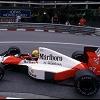Turbo cars
#1

Posted 25 October 2007 - 20:58
Advertisement
#2

Posted 25 October 2007 - 21:00
#3

Posted 25 October 2007 - 21:00
Only in our dreams.
#4

Posted 26 October 2007 - 10:47
#5

Posted 26 October 2007 - 12:20
Originally posted by Dunc
I read somewhere that these are being phased back in. Has anyone else heard this?
Max Mosley proposed a new engine formula for 2012 on which was four-cylinder direct-injection turbo engines burning bioethanol or similar. The proposal also included some sort of wacky thermal energy recovery system as well although I'm not sure how that would work with much of the exhaust gas energy being used by the turbo. Anyway, I believe this formula originally came from BMW as Dr. Mario talks about in an interview in Race Engine Technology magazine (done at the British GP this year) as being proposed by them.
Since then the manufacturers have got their heads together and proposed that they want to keep naturally aspirated V8 engines with a fuel-flow restrictor and the previously discussed kinetic energy recovery system as the token 'green' features. The FIA doesn't like this so they have countered with a proposal to keep the current technology completely frozen for 10 years. I expect there will be some compromise in the future, but the current engines look to be frozen for next year anyway.
#6

Posted 26 October 2007 - 13:45
Pre restrictor days (1986) these engines could run with over 8 bar of boost and in qualifying the BMW turbo engine was reputed to put out 1150bhp @ 11500rpm @ 5.5 bar boost, the Renault V6 could reach about 1300BHP, due to its lightweight pneumatic value system, in the race the turbo cars were running about 850-950bhp.
So in Qualifying trim that’s nearly 50% more power today’s F1 cars who put out around 775bhp @ 19000rpm. It was suggested that without the restrictors that were put in place in 1987 the BMW turbo engine could deliver up to 1400bhp that’s amazingly nearly 1bhp per CC displacement!
In 1988 the McLaren Honda Turbo cars raced with FIA pop valves set to 2.5 bar and the power was closer to 680/690bhp @ 12500rpm. Driving a high performance turbo engine is different to a NA engine, the engine revs have to remain high to keep the turbo spooled up and on boost, power delivery is not smooth but comes in waves of power. Delivery is much more logarithmic with more power increasing exponentially with engine revs. Turbos were eventually banned by the FIA, the official line was due to fuel rationing, however it is suspected turbos were banned as it was feared that over boosting could occur (forced air could enter into the plenum chamber faster than the pop-off value could expel it).
#7

Posted 26 October 2007 - 13:57
Natural aspiration is so much sexier anyway.
#8

Posted 26 October 2007 - 17:47
Originally posted by ATM_Andy
It is a shame, in 1988 (last ever year of the turbo) the McLaren Honda MP4-4 totally dominated the season achieving pole position in all but 1 race and winning all but 1 race, and that race was only lost due to a back marker error.
I think you will find that was 100% sennas fault
#9

Posted 26 October 2007 - 17:57
New to the forum. Hell of a season if I do say so myself!
I read somewhere that these are being phased back in. Has anyone else heard this?
I read in F1 Racing Magazine earlier this year that turbo's are proposed for 2011 along with V6 engines...
#10

Posted 26 October 2007 - 18:30
Originally posted by ATM_Andy
Pre restrictor days (1986) these engines could run with over 8 bar of boost and in qualifying the BMW turbo engine was reputed to put out 1150bhp @ 11500rpm @ 5.5 bar boost, the Renault V6 could reach about 1300BHP, due to its lightweight pneumatic value system, in the race the turbo cars were running about 850-950bhp.
So in Qualifying trim that’s nearly 50% more power today’s F1 cars who put out around 775bhp @ 19000rpm. It was suggested that without the restrictors that were put in place in 1987 the BMW turbo engine could deliver up to 1400bhp that’s amazingly nearly 1bhp per CC displacement!
The BMW could deliver 1500bhp in qualifying trim (that's a specific power output of 1000bhp/L!), early versions of the engine were production blocks from scrapped road cars that had done over 100,000km, they figured that the engine had already taken a lot of stress and they could find the good blocks that could stand more stress. Later versions were new blocks that were aged in the factory to replicate the nature of a used engine. Other legends have it that BMW engineers would take the blocks outside and piss on them as nitrogen hardens the surface of steel.
#11

Posted 26 October 2007 - 18:56
#12

Posted 26 October 2007 - 18:59
Originally posted by Alfisti
never gonna happen. If they did a 1.5 ltr turbo now they wold hit 2000+HP with todays technology.
Not if you limit the amount of air or fuel allowed to enter the engine or even reduced the engine capacity further, 0.6L perhaps.
#13

Posted 26 October 2007 - 19:37
The BMW could deliver 1500bhp in qualifying trim (that's a specific power output of 1000bhp/L!), early versions of the engine were production blocks from scrapped road cars that had done over 100,000km, they figured that the engine had already taken a lot of stress and they could find the good blocks that could stand more stress. Later versions were new blocks that were aged in the factory to replicate the nature of a used engine. Other legends have it that BMW engineers would take the blocks outside and piss on them as nitrogen hardens the surface of steel.
I'm afraid the 1500bhp mark is thought to be a bit of an urban myth amongst F1 engineers. In 1986 the engines lacked the compression ratio, the revs and and the Boost necessary, to achieve 1500bhp. The maximum output of the BMW was at though to be around 1400bhp and only for less than a second. At 5.5 bar + a bit of over boost a 1.5 litre would require roughly 16,000+ revs to get 1500bhp and the BMW would peak at about 13000revs. You have to remember that the BMW engine used a standard valve gear, where as the Renault turbo engine pioneered the use of a pneumatic valve system that modern F1 engines still use today, this allowed the Renault to rev higher and for longer.
If you could make a Modern F1 engine under the 1986 rules I estimate that you could achieve approx 22,500rpm (being a V6) and at a boost of around 8.5-9 bar. That would give you around 2,300bhp (this is a rough calculation and there could be a few unforeseen variables). Either way 2000+ bhp and no TC would be pretty fun, assuming you could get the power to the tarmac you'd defiantly leave every current car on the grid standing as they have about 800bhp.
It is true that a BMW F1 turbo engine has completed a mileage of over 64,000 miles and I believe it is still going, however I'm not sure about what state of tune it is in, it may way have a 2.5 bar pop off valve connected giving the engine about 650bhp. Even so when you consider that a modern F1 engine cannot complete more than 6 hours of use really shows the strength of the BMW engine. The 4 cyl BMW turbo engine was a version of the M10 engine that BMW used in there E30 and E36 3-series road car into the mid 1990's...
#14

Posted 26 October 2007 - 21:57
Originally posted by Mika Mika
I'm afraid the 1500bhp mark is thought to be a bit of an urban myth amongst F1 engineers. In 1986 the engines lacked the compression ratio, the revs and and the Boost necessary, to achieve 1500bhp. The maximum output of the BMW was at though to be around 1400bhp and only for less than a second. At 5.5 bar + a bit of over boost a 1.5 litre would require roughly 16,000+ revs to get 1500bhp and the BMW would peak at about 13000revs. You have to remember that the BMW engine used a standard valve gear, where as the Renault turbo engine pioneered the use of a pneumatic valve system that modern F1 engines still use today, this allowed the Renault to rev higher and for longer.
If you could make a Modern F1 engine under the 1986 rules I estimate that you could achieve approx 22,500rpm (being a V6) and at a boost of around 8.5-9 bar. That would give you around 2,300bhp (this is a rough calculation and there could be a few unforeseen variables). Either way 2000+ bhp and no TC would be pretty fun, assuming you could get the power to the tarmac you'd defiantly leave every current car on the grid standing as they have about 800bhp.
It is true that a BMW F1 turbo engine has completed a mileage of over 64,000 miles and I believe it is still going, however I'm not sure about what state of tune it is in, it may way have a 2.5 bar pop off valve connected giving the engine about 650bhp. Even so when you consider that a modern F1 engine cannot complete more than 6 hours of use really shows the strength of the BMW engine. The 4 cyl BMW turbo engine was a version of the M10 engine that BMW used in there E30 and E36 3-series road car into the mid 1990's...
I'd heard that the BMW's got to about 1400 bhp too (i think Berger mentioned it recently in an article in F1 racing about favourite cars, or he was waxing lyrical somewhere about it anyway...) and @ Pollocka, I'd heard exactly the same too, the story of mechanics peeing on the blocks to 'weather' them, priceless but maybe urban myth (though I do hope not lol).
The theoretical 2300 bhp is believable but nonsensical too of course....as a curiosity, what would the outputs be if the 'turbo' was merely a feed for the KERS (kinetic recovery) system? i.e. the V6 engine produces the raw power as per usual, but the turbo feeds a KERS-style 'overtaking' boost? might not even need a pop-off valve (IndyCar never truly mastered them iirc, and they tried for a long time.....)
just a thought ;)
#15

Posted 26 October 2007 - 22:04
#16

Posted 27 October 2007 - 08:59
The theoretical 2300 bhp is believable but nonsensical too of course....
True 2300bhp would probably be possible, id love to have the budget to try, however the FIA would simply never allow it... Spoil sports ;-)...
#17

Posted 27 October 2007 - 09:40
Originally posted by pollocka
Other legends have it that BMW engineers would take the blocks outside and piss on them as nitrogen hardens the surface of steel.
I also heard they buried the blocks in a graveyard for up to a year in order to stress relieve them further.
#18

Posted 27 October 2007 - 10:06
#19

Posted 27 October 2007 - 22:05
Originally posted by DieGrueneHoelle
if champ car and irl werent struggling it would be their chance to close up to formula one lap times and try to steal the crown of being the fastest formula series. perhaps then we will see more powerful engines again. or perhaps a new sportcar series as a challenger. > 1000 hp, vmax = 400. formula one needs competition and a lot of bullshit rules will fade away...
What about ALMS? How restricted are their engines?
Advertisement
#20

Posted 28 October 2007 - 11:16
Originally posted by Mika Mika
I'm afraid the 1500bhp mark is thought to be a bit of an urban myth amongst F1 engineers. In 1986 the engines lacked the compression ratio, the revs and and the Boost necessary, to achieve 1500bhp. The maximum output of the BMW was at though to be around 1400bhp and only for less than a second. At 5.5 bar + a bit of over boost a 1.5 litre would require roughly 16,000+ revs to get 1500bhp and the BMW would peak at about 13000revs. You have to remember that the BMW engine used a standard valve gear, where as the Renault turbo engine pioneered the use of a pneumatic valve system that modern F1 engines still use today, this allowed the Renault to rev higher and for longer.
If you could make a Modern F1 engine under the 1986 rules I estimate that you could achieve approx 22,500rpm (being a V6) and at a boost of around 8.5-9 bar. That would give you around 2,300bhp (this is a rough calculation and there could be a few unforeseen variables). Either way 2000+ bhp and no TC would be pretty fun, assuming you could get the power to the tarmac you'd defiantly leave every current car on the grid standing as they have about 800bhp.
It is true that a BMW F1 turbo engine has completed a mileage of over 64,000 miles and I believe it is still going, however I'm not sure about what state of tune it is in, it may way have a 2.5 bar pop off valve connected giving the engine about 650bhp. Even so when you consider that a modern F1 engine cannot complete more than 6 hours of use really shows the strength of the BMW engine. The 4 cyl BMW turbo engine was a version of the M10 engine that BMW used in there E30 and E36 3-series road car into the mid 1990's...
I will take the above as read (ie most of the informed posters as I'm a software guy not a mechanical engineer). However, I seem to remember in an Autocourse c.1987 a couple of points. Any informed posters feel free to agree/disagree as necessary as this is an educational exercise for me as well.
* The Ferrari was limited to about 1200hp max as it had an alloy block and could not be boosted any higher as the block would become unstable.
* The BMWs would go to about 1350hp in qualifying trim but were capable of a bit more but were undriveable as they had plenty of lag from a big single turbo
* IIRC the TAG suffered the same issues as the Ferrari
* Allegedly the RA168E (?) in the 1986 Williams- Honda was good, for one lap for 1525 hp. I have always found that one a little hard to believe.
Anyhow, if someone has better info on the questions, especially the Honda one, it would be much appreciated.
#21

Posted 28 October 2007 - 16:49
#23

Posted 29 October 2007 - 00:33
#24

Posted 29 October 2007 - 03:14
Originally posted by CIN
Since the subject is the Honda Turbo engines. Here are 2 official dynos of the 1987 and 1988 engines.
Thanks.
I figured after twenty years, I don't think Honda, BMW, Ferrari or Renault give a fig whether the dyno reports matter one whit if they get on the net.
A thorough search of wiki pedia would probably have some goodies.
Hmmmm.......
#25

Posted 29 October 2007 - 03:41
Originally posted by Atreiu
How many hp is that?
1hp = 0.75kW (or pretty close)
therefore
750kW = 1000hp
#26

Posted 29 October 2007 - 06:48
#27

Posted 29 October 2007 - 07:18
Since the subject is the Honda Turbo engines. Here are 2 official dynos of the 1987 and 1988 engines.
Yep that looks about right for the Turbo engines in racing trim. You can see that the 1988 engine is onlly at about 2/3rds power because of 2.5bar the pop off valve.
Luca De Mozzarella, said he was thinking about competing next years championship with 8 litre cars... Id of definatly gone down the turbo route myself ;-).
#28

Posted 29 October 2007 - 18:15
Originally posted by ATM_Andy
It is a shame, in 1988 (last ever year of the turbo) the McLaren Honda MP4-4 totally dominated the season achieving pole position in all but 1 race and winning all but 1 race, and that race was only lost due to a back marker error. The MP4-4 is arguably the most dominant F1 car in History. At the time the teams were able to race with either a 3.5 liter naturally aspirated engine (any cylinder format) or a 1.5 Liter Turbo charged car (any cylinder format).
Pre restrictor days (1986) these engines could run with over 8 bar of boost and in qualifying the BMW turbo engine was reputed to put out 1150bhp @ 11500rpm @ 5.5 bar boost, the Renault V6 could reach about 1300BHP, due to its lightweight pneumatic value system, in the race the turbo cars were running about 850-950bhp.
So in Qualifying trim that’s nearly 50% more power today’s F1 cars who put out around 775bhp @ 19000rpm. It was suggested that without the restrictors that were put in place in 1987 the BMW turbo engine could deliver up to 1400bhp that’s amazingly nearly 1bhp per CC displacement!
In 1988 the McLaren Honda Turbo cars raced with FIA pop valves set to 2.5 bar and the power was closer to 680/690bhp @ 12500rpm. Driving a high performance turbo engine is different to a NA engine, the engine revs have to remain high to keep the turbo spooled up and on boost, power delivery is not smooth but comes in waves of power. Delivery is much more logarithmic with more power increasing exponentially with engine revs. Turbos were eventually banned by the FIA, the official line was due to fuel rationing, however it is suspected turbos were banned as it was feared that over boosting could occur (forced air could enter into the plenum chamber faster than the pop-off value could expel it).
Great days in the sun!!!
I was in Brazil in '85 and saw it heard it and smelt it myself. The best days of F1....
#29

Posted 29 October 2007 - 18:27
Originally posted by nmansellfan
IIRC, I don't think any of the engine manufacturers during the turbo era had dynos that went above 1000bhp...?
This is covered in 'The 1000bhp Grand Prix Cars', an excellent if very detailed read for anyone interested in the technical development of these amazing machines.
The BMW did hit an estimated 1450bhp on one occasion, when Berger saw a flash 5.5bar readout on a qualifying lap (in Austria? I'm not sure - book not to hand.) However, no dyno confirmation could be issued thanks to the problem outlined above.
Another interesting tale from the era is told by Rene Arnoux, who explains the Renault, in 1980-1982, had a button that would momentarily add boost, which the drivers were instructed to use only sparingly in qualifying. he pressed his again, and again, and again on the way to many poles! 'Push to pass' was around back then...























